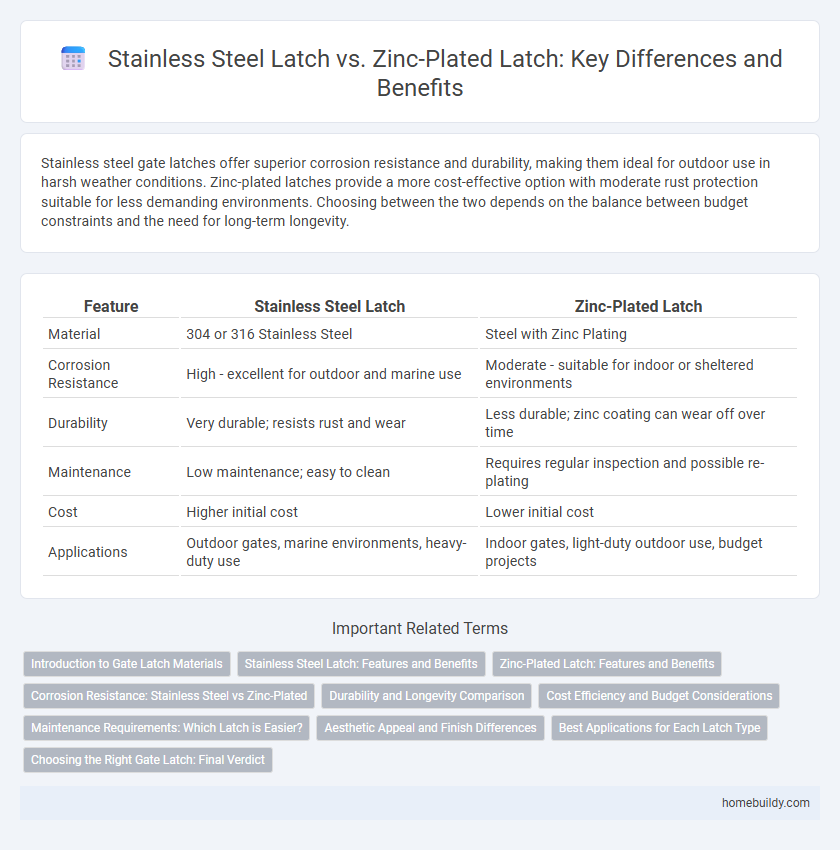Stainless steel gate latches offer superior corrosion resistance and durability, making them ideal for outdoor use in harsh weather conditions. Zinc-plated latches provide a more cost-effective option with moderate rust protection suitable for less demanding environments. Choosing between the two depends on the balance between budget constraints and the need for long-term longevity.
Table of Comparison
| Feature | Stainless Steel Latch | Zinc-Plated Latch |
|---|---|---|
| Material | 304 or 316 Stainless Steel | Steel with Zinc Plating |
| Corrosion Resistance | High - excellent for outdoor and marine use | Moderate - suitable for indoor or sheltered environments |
| Durability | Very durable; resists rust and wear | Less durable; zinc coating can wear off over time |
| Maintenance | Low maintenance; easy to clean | Requires regular inspection and possible re-plating |
| Cost | Higher initial cost | Lower initial cost |
| Applications | Outdoor gates, marine environments, heavy-duty use | Indoor gates, light-duty outdoor use, budget projects |
Introduction to Gate Latch Materials
Stainless steel gate latches offer superior corrosion resistance and durability, making them ideal for outdoor and harsh environments. Zinc-plated latches provide a cost-effective solution with moderate rust protection, suitable for less demanding conditions. Selecting the appropriate material depends on exposure to weather, maintenance frequency, and longevity requirements.
Stainless Steel Latch: Features and Benefits
Stainless steel gate latches offer superior corrosion resistance and durability, making them ideal for outdoor and harsh environments. Their robust construction provides long-lasting performance without rusting, ensuring reliable security and minimal maintenance. Compared to zinc-plated latches, stainless steel latches maintain their strength and aesthetic appeal over time, especially in coastal or high-humidity areas.
Zinc-Plated Latch: Features and Benefits
Zinc-plated latches offer superior corrosion resistance compared to standard steel options, making them ideal for outdoor gate applications exposed to moisture and harsh weather conditions. The zinc coating provides a durable barrier that prevents rust and extends the latch's lifespan without the higher cost of stainless steel. Their cost-effectiveness combined with reliable protection makes zinc-plated latches a popular choice for residential and commercial gates requiring moderate durability and strength.
Corrosion Resistance: Stainless Steel vs Zinc-Plated
Stainless steel latches offer superior corrosion resistance due to their chromium content, forming a passive oxide layer that prevents rust and withstands harsh weather conditions. Zinc-plated latches provide a protective barrier through electroplated zinc coating, which delays rust but can deteriorate over time under prolonged exposure to moisture. For long-term durability in outdoor or marine environments, stainless steel latches are the preferred choice to maintain structural integrity and aesthetic appeal.
Durability and Longevity Comparison
Stainless steel latches offer superior durability and corrosion resistance, making them ideal for outdoor and harsh environments where exposure to moisture and chemicals is frequent. Zinc-plated latches provide moderate rust protection through a zinc coating but are more prone to wear and corrosion over time, especially in high-humidity or salty conditions. The longevity of stainless steel latches typically exceeds that of zinc-plated options, ensuring sustained performance and minimal maintenance.
Cost Efficiency and Budget Considerations
Stainless steel gate latches offer superior durability and corrosion resistance, making them a cost-efficient choice for long-term use despite a higher initial price. Zinc-plated latches have a lower upfront cost but may require more frequent replacement or maintenance due to rust and wear. Budget considerations should weigh the lifecycle cost, where stainless steel provides better value in environments exposed to harsh weather or moisture.
Maintenance Requirements: Which Latch is Easier?
Stainless steel gate latches require minimal maintenance due to their resistance to rust and corrosion, making them ideal for outdoor use in harsh weather conditions. Zinc-plated latches need regular inspection and occasional re-coating to prevent rusting, especially in humid or coastal environments. Overall, stainless steel latches offer easier upkeep and longer-lasting durability compared to zinc-plated alternatives.
Aesthetic Appeal and Finish Differences
Stainless steel gate latches offer a sleek, modern aesthetic with a naturally polished finish that resists tarnishing and corrosion, maintaining their appearance over time. Zinc-plated latches provide a more utilitarian look with a shiny, reflective coating that can dull or chip under harsh weather conditions. The stainless steel finish requires less maintenance to preserve its visual appeal, making it ideal for gates where longevity and consistent appearance are priorities.
Best Applications for Each Latch Type
Stainless steel latches excel in outdoor and marine environments due to their superior corrosion resistance and durability under harsh weather conditions. Zinc-plated latches are ideal for indoor or sheltered areas where moisture exposure is limited, providing a cost-effective solution with adequate rust protection. Choosing between these types depends on the specific environmental exposure and longevity requirements of the gate installation.
Choosing the Right Gate Latch: Final Verdict
Stainless steel gate latches offer superior corrosion resistance, durability, and low maintenance, making them ideal for outdoor environments exposed to moisture or salt air. Zinc-plated latches provide a cost-effective solution with moderate rust protection, suitable for less demanding applications or indoor use. Choosing between stainless steel and zinc-plated latches depends on budget constraints and the level of weather resistance required for long-term gate security.
stainless steel latch vs zinc-plated latch Infographic

 homebuildy.com
homebuildy.com